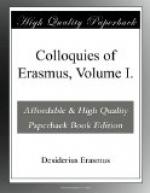Hi. Methinks you speak Hebrew, and not English.
Le. Have any of you heard any equivocal Word?
Hi. No.
Le. What then can be more foolish than to desire to turn that which cannot possibly be turn’d. For although the Greek Word [Greek: manthanein], signifies as much as [Greek: mathein] and [Greek: matheteuein], so among the Latins, discere, to learn, signifies as much as doctrinam accipere, or doctrinam tradere. But whether this be true or no I can’t tell. I rather think [Greek: manthanein], is of doubtful Signification with the Greeks, as cognoscere is among the Latins. For he that informs, and the Judge that learns, both of them know the Cause. And so I think among the Greeks the Master is said [Greek: manthanein] whilst he hears his Scholars, as also the Scholars who learn of him. But how gracefully hath he turn’d that [Greek: ta gar apostomatizomena manthanousin oi grammatikoi], nam secundum os grammatici discunt: For the Grammarians are tongue-learn’d; since it ought to be translated, Nam grammatici, quae dictitant, docent: Grammarians teach what they dictate. Here the Interpreters ought to have given another Expression, which might not express the same Words, but the same Kind of Thing. Tho’ I am apt to suspect here is some Error in the Greek Copy, and that it ought to be written [Greek: homonumon to te xunienai kai to lambanein]. And a little after he subjoins another Example of Ambiguity, which arises not from the Diversity of the Signification of the same Word, but from a different Connection, [Greek: to boulesthai labein me tous polemious], velleme accipere pugnantes. To be willing that I should receive the fighting Men: For so he translates it, instead of velle me capere hostes, to be willing that I take the Enemies; and if one should read [Greek: boulesthe], it is more perspicuous. Vultis ut ego capiam hostes? Will ye that I take the Enemies? For the Pronoun may both go before and follow the Verb capere. If it go before it, the Sense will be this, Will ye that I take the Enemies? If it follows, then this will be the Sense, Are ye willing that the Enemies should take me? He adds also another Example of the same Kind, [Greek: ara ho tis ginoskei, touto ginoskei]. i.e. An quod quis novit hoc novit. The Ambiguity lies in [Greek: touto]. If it should be taken in the accusative Case, the Sense will be this; Whatsoever it is that any Body knows, that Thing he knows to be. But if in the nominative Case, the Sense will be this, That Thing which any Body knows, it knows; as though that could not be known that knows not again by Course. Again he adds another Example. [Greek: apa ho tis hora, touto hora; hora de ton kiona hoste hora ho kion]. That which any one sees, does that Thing see; but he sees a Post, does the Post therefore see?




